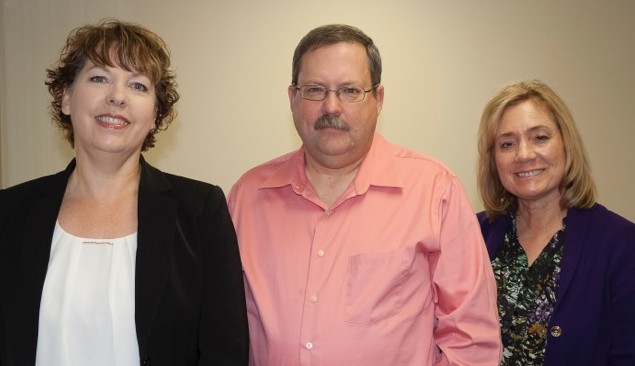The Lincoln SDA Credit Union, organized January 19, 1965 by a group of visionary Lincoln Adventist business leaders to serve members of the Seventh-day Adventist Church, is celebrating it’s 50th anniversary this year. Originally sited on the campus of Union College, the LSDACU is now located on Prescott Avenue in the College View neighborhood.
According to Lincoln SDA Credit Union manager and CEO Lisa Bednar Forbes, credit unions are member owned, not-for-profit, democratically controlled, volunteer-led cooperatives. Members of the credit union pool their money in the form of deposits to lend to other members.
“Each credit union determines its field of membership in its bylaws, which dictates the qualifications for membership,” said Forbes. “The Lincoln SDA Credit Union serves any Seventh-day Adventist church member or minor family member of those qualified for membership living anywhere in the United States.”
Because credit unions are not-for-profit institutions, making money is not their goal. “We do not focus on making large profits to pay to a group of share holders,” Forbes explained. “Instead our purpose is to return profits back to the members in the form of higher dividends, lower loan rates, and products and services to meet our members’ needs.”
Celebrations and challenges
The credit union industry, which recently surpassed the 100 million member mark nationwide, is struggling to cope with the massive amount of new regulations that resulted from the Dodd-Frank Wall Street Reform and Consumer Protection Act passed in 2010 as a response to the Great Recession. “Many of the regulations make some sense in regulating the super-sized banks, but small credit unions and community banks must also comply with most of the regulations,” Forbes said. “We have far fewer resources than large banks and cannot afford to have a fulltime attorney or compliance officer on staff. Therefore, credit unions have gotten creative and developed ways to share resources.”
But even so, they are no longer allowed to offer some of the products they offered pre Frank-Dodd. “When I came to the credit union as the assistant manager in 2009, a large part of the loan portfolio was comprised of 7-year balloon real estate loans which we are no longer able to offer under the new regulations,” explained Forbes. “So again, we had to get creative and in 2010 we partnered with a mortgage lending vendor, which works only with credit unions, to process our mortgages. Credit unions and their vendors generally share most of the same conservative values of the SDA church so this partnership was a good fit and has benefited both the credit union and its members. As a result of that partnership our members now have access to a larger selection of loan products including conventional, FHA, and VA loans with fixed or variable rates and terms up to 30 years.”
The extended low-interest rate environment has further challenged financial institutions of all sizes. The Federal Reserve rate of 0% costs them thousands of dollars each year of interest income on reserves and investments. “No one predicted that the rates would remain this low for this long,” Forbes stated.
As a result, financial institutions are being forced to find new ways to meet their budgets and many banks are doing this by charging more fees to their customers. The Board of Directors at the Lincoln SDA Credit Union has chosen not to add any new fees or increase existing fees at this time.
People before profits
“We are extremely well-capitalized and it is the board’s goal to weather this storm with minimal impact to our members,” said board chairman Bruce Griffith. “We put people before profits.”
Norman Peterson, assistant manager for the Lincoln SDA Credit Union, says consumers have become more aware that credit unions offer the same services as banks. “But credit union members aren’t customers,” he added. “They’re owners. And because credit unions are a financial cooperative, they return financial benefits directly to their members.”
Forbes has observed that millennials are turning to credit unions in record numbers. They came to age in the midst of the financial crisis and credit unions fit into their philosophy as a grassroots, organic institution.
“During the recession we saw our members, and the general population, start paying down their debt with reluctance to take on any new debt,” Forbes stated. “Since lending is a large part of our earnings, the low loan demand has impacted our bottom line. With a returned sense of stability in the job market, we are beginning to see an increase in lending again but I still sense an underlying fear in many of our members. Consumer confidence has not yet returned to pre-recession levels.”
Technology in the payments industry is moving faster than probably any other area. “During 2015 we will be transitioning our Visa credit cards to the Euro MasterCard Visa chip technology to help combat fraud and protect our members’ data,” said Forbes. “It will come at a cost to the credit union but we feel our members’ security is critical and worth the investment. The credit union was founded on the philosophy of ‘People Helping People’ and that is still our mission.”
Did you know?
The Lincoln SDA Credit Union is a full-service institution offering savings, checking (share draft), share certificates, debit and credit cards, online banking, bill pay, and numerous loan products including personal, auto and home. Deposits are insured to at least $250,000 by the National Credit Union Share Insurance Fund. For more information call 402.489.8886 or toll free 800.244.7168 or visit www.lincolnsdacu.org. You can also email lsdacu@lincolnsdacu.org.
Photo Caption: Lincoln SDA Credit Union employees are eager to serve members living in any location in North America. (l-r) Lisa Bednar Forbes, manager/CEO; Norman Peterson, assistant manager; Joyce Jensen, operations manager.
Photo Credit: Bruce Forbes
Brenda Dickerson is communication director for the Mid-America Union.










